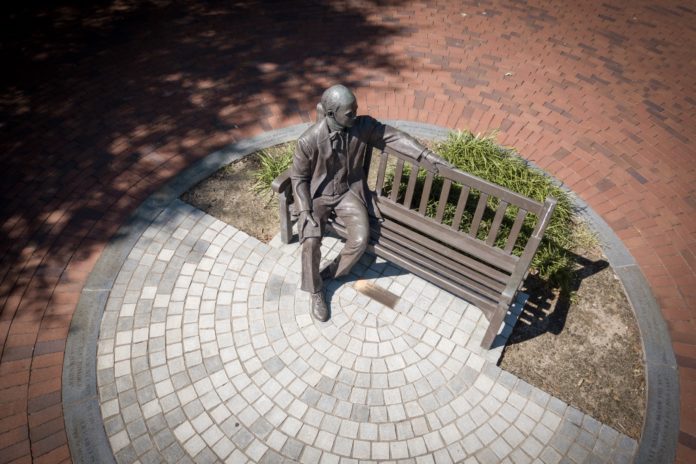MACON — Richard Fallis, Ph.D., dean of Mercer University’s College of Liberal Arts – the University’s oldest academic unit – will retire from the post at the end of the academic year. Dr. Fallis has served as dean of the college for eight years and holds a faculty appointment in English in the College. Following a sabbatical, Dr. Fallis plans to return to full-time teaching.
“Since 2001, more than 40 new faculty members have joined us. In terms of preparation and ability, our students have improved substantially. Our efforts in service-learning, undergraduate research and study abroad have all grown and become richer and the results from the National Survey of Student Engagement – and the fact that we have our highest retention rate ever – tell me that CLA does many things well,” Dr. Fallis said. “I think the most important things a dean can do are build and support faculty and press for the richest learning environment possible for students. Both of those really depend so much on faculty members and students that no dean should take too much credit. But even with some growing pains, CLA seems to me even better now than it was in 2001, so I’m satisfied.”
“Mercer University is indebted to Rich Fallis for the wise, collaborative and effective leadership he has provided the College of Liberal Arts over the past eight years,” said Mercer President William D. Underwood. “I am grateful that he will continue to serve Mercer and its students in the classroom, which is the highest calling for an academic.”
Under Dr. Fallis’ leadership, the College augmented its mission to provide engaged learning experiences for its students. He also worked to support new and established faculty members to develop innovative teaching methods and significant research. Dr. Fallis also supported new initiatives in service-learning, undergraduate research and study abroad, enhancing Mercer’s reputation as a national leader in the liberal arts. The College restructured and expanded its Honors Program and added honor societies in several academic disciplines, including a chapter of Sigma Xi, the faculty honor society for engineering and science researchers. The College also added new majors and concentrations under Dr. Fallis’ leadership in such areas as biochemistry/microbiology, computational science, journalism, media studies and southern studies. In addition, the College built cooperative relationships with other Mercer schools and colleges to enhance student research opportunities.
“It has been a privilege to serve with Dean Fallis,” said Mercer Provost Wallace L. Daniel. “He is person of indisputably high character and great integrity, who has been a wonderful colleague and who will continue to serve the Mercer community in various special ways. His tenure as dean is marked by many accomplishments, including his consistent support for undergraduate research, for strong classroom teaching and for encouragement of dialogue about major academic issues. A gifted teacher and writer himself, he leads by example, and his advocacy of the liberal arts and sciences is very much needed and appreciated.”
A native of Tennessee, Dr. Fallis earned a Bachelor of Arts in English and interdisciplinary studies from Wake Forest University and a Ph.D. in English from Princeton, where he was a Woodrow Wilson Fellow. He began his professional career at Syracuse University in 1971. During the ensuing 24 years, he received awards for teaching, taught in Syracuse’s program in London, and served as director of graduate studies and chair of the English Department. In 1995, he went to Belmont University as professor of English and dean of the School of Humanities/Education. In 1999, he became the founding dean of Belmont’s College of Arts and Sciences. While at Belmont, he helped plan a new center for the visual arts, instituted a visiting Humanities Scholars program, and supervised successful accreditation processes in several fields.
The author of a history of modern Irish literature, he is founding editor of the “Irish Studies Series” from the Syracuse University Press and more than 60 books were published under his direction. Active in professional organizations, he is a member of the American Conference of Academic Deans and the Council of Colleges of Arts and Sciences. He has received research grants from the National Endowment for the Humanities, American Philosophical Society, Yeats Society (Ireland) and the Syracuse University Faculty Fellowship Fund.
Dr. Fallis noted that he is eager to return to the classroom. “Teaching is the heart of our work in the College, and I look forward to being back in the classroom fulltime,” he said.
About Mercer University
Founded in 1833, Mercer University is a dynamic and comprehensive center of undergraduate, graduate and professional education. The University enrolls more than 8,000 students in 11 schools and colleges – liberal arts, law, pharmacy, medicine, business, engineering, education, theology, music, nursing and continuing and professional studies – on major campuses in Macon, Atlanta and Savannah and at three regional academic centers across the state. Mercer is affiliated with two teaching hospitals — Memorial University Medical Center in Savannah and the Medical Center of Central Georgia in Macon, and has educational partnerships with Warner Robins Air Logistics Center in Warner Robins and Piedmont Healthcare in Atlanta. The University operates an academic press and a performing arts center in Macon and an engineering research center in Warner Robins. Mercer is the only private university in Georgia to field an NCAA Division I athletic program. For more information, visit www.mercer.edu.
— 30 —










